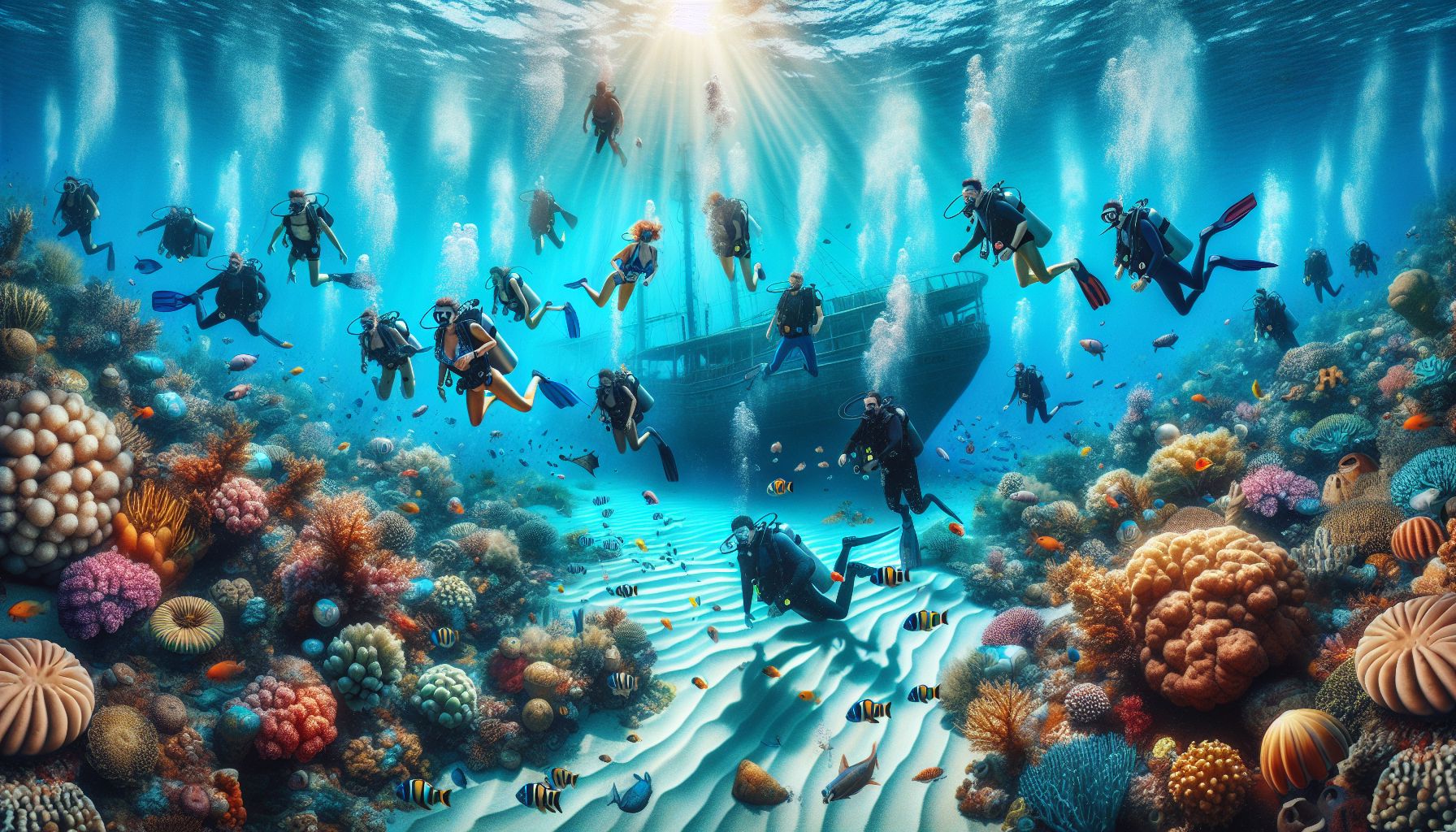Have you ever longed to escape the mundane and explore the mysterious depths of the ocean? Scuba diving offers just that – a chance to immerm yourself in a world bountiful with vibrant marine life, serene landscapes, and experiences that will leave you in awe. This comprehensive guide will plunge you into the adventurous world of scuba diving, from the basic know-how to conservation efforts that keep the underwater realms thriving.
Understanding Scuba Diving
Scuba diving is an underwater diving activity involving the use of a self-contained underwater breathing apparatus (scuba) which is completely independent of surface supply, allowing divers the freedom to explore the underwater world for extended periods. The term ‘scuba’ itself is an acronym: “Self-Contained Underwater Breathing Apparatus”.
Getting Started: Certification and Training
Before you can dive into the deep blue, you’ll need proper certification. Organizations like PADI (Professional Association of Diving Instructors), NAUI (National Association of Underwater Instructors), and SSI (Scuba Schools International) offer courses that include classroom study, confined water dives (practice in a pool-like environment), and open water dives.
- PADI Open Water Diver: The most popular beginner course, which involves understanding basic principles of scuba diving, including equipment usage, diving safety, and environment-friendly diving practices.
- NAUI Scuba Diver: Known for thorough training and emphasis on safety, the NAUI Scuba Diver course is another great option for beginners.
- SSI Open Water Diver: SSI allows for flexibility in learning, often offering a blend of online instruction along with practical in-water training.
The Gear You’ll Need
Diving gear is essential to your ability to breathe, see, and move underwater. Here is a list of basic equipment:
- Scuba Tank: This cylinder holds the air you breathe while diving.
- Regulator: It delivers air from your tank to you at the pressure you can breathe comfortably.
- Move Buoyancy Control Device (BCD): Helps you maintain neutral buoyancy while diving.
- Dive Computer: Tracks your depth, time underwater, and decompression status to keep you diving safely.
- Wetsuit or Drysuit: Provides thermal insulation.
- Fins: Facilitate movement through the water.
- Mask: Allows you to see underwater.
- Weights: Help in adjusting your buoyancy to make sinking beneath the surface easier.
Safety Precautions: The Key to Enjoyable Dives
Scuba diving is exhilarating, but respect for safety protocols is non-negotiable. Before and during every dive, remember to:
- Never hold your breath: Always breathe steadily and never hold your breath while ascending or descending, as this could lead to lung overexpansion injuries due to changes in air volume under pressure.
- Equalize early and often: Ascending and descending give rise to pressure changes that can affect air-filled spaces in your body, so equalize your ears and sinuses to prevent discomfort.
- Check your gear: Prior to diving, make sure all your equipment is in good working order.
- Dive within your limits: Don’t attempt dives that exceed your training or comfort level.
- Plan your dive and dive your plan: Coordinate with your dive buddy to set limits for depth and time, and stick to them.
- Monitor air supply: Regularly check how much air you have left to ensure you have enough to complete your dive safely.
The Enthralling Experiences of Scuba Diving
Scuba diving offers experiences for all levels, from tranquil coral reef explorations to the thrill of wreck penetration and cave diving. Popular diving experiences include:
- Reef Diving: Explore intricate coral ecosystems and the abundance of life they support.
- Wreck Diving: Investigate sunken ships, airplanes, and even underwater museums.
- Cave Diving: Delve into submerged caves for a unique look at geological formations.
- Night Diving: Experience a different side of the ocean as nocturnal creatures emerge.
Diving’s Greatest Destinations
Around the world, there are sites that offer spectacular diving experiences:
- The Great Barrier Reef, Australia: The world’s largest coral reef system.
- SS Thistlegorm, Red Sea, Egypt: A World War II wreck that is now a popular dive site.
- Blue Hole, Belize: A giant marine sinkhole famed for its deep blue waters.
- Silfra Fissure, Iceland: Offers crystal clear waters and the experience of diving between two tectonic plates.
Beyond Adventure: Conservation and Ethics
As a diver, you’re in a unique position to witness the beauty and the fragility of aquatic ecosystems. Organizations like Project AWARE work towards ocean conservation through various initiatives focusing on areas like protecting sharks and rays, addressing the marine debris crisis, and more. Here are some ethical diving code-of-conduct:
- Look, don’t touch: Preserve marine life and their habitats by avoiding physical contact.
- Be mindful of your fins: Avoid stirring up sediment, which can damage the fragile underwater environment.
- Responsible interaction with wildlife: Refrain from feeding fish or other aquatic animals as it disrupts their natural behaviors.
- Emergency First Response training is important for handling potential underwater injuries and accidents.
Further Resources and References
To deepen your knowledge and understanding of scuba diving, consider visiting the following reputable sources:
- Professional Association of Diving Instructors (PADI) – The world’s leading scuba diver training organization.
- National Association of Underwater Instructors (NAUI) – A not-for-profit association known for its high standards of diver education.
- Scuba Schools International (SSI) – A global training agency that offers internationally-recognized scuba certifications.
Scuba diving opens up a dimension of our planet that few have the privilege of experiencing firsthand. It inspires us not only with its inherent beauty and excitement but also with the responsibility we owe to these precious underwater worlds. Whether you’re admiring the minute intricacies of a coral polyp or floating alongside a gentle giant of the ocean, scuba diving is an adventure that beckons with the promise of discovery. With the right training, gear, and respect for the environment, the depths are yours to explore. Take the plunge and become part you of the scuba diving community – you won’t regret it!
